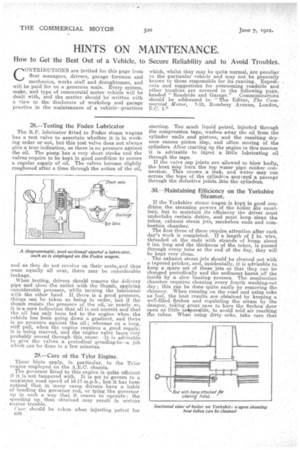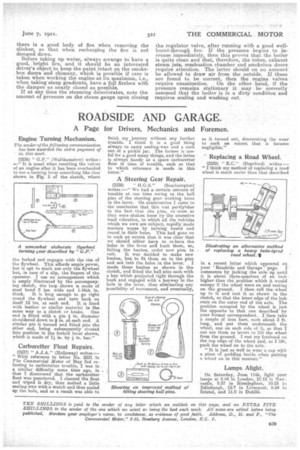HINTS ON MAINTENANCE.
Page 30

Page 31

If you've noticed an error in this article please click here to report it so we can fix it.
How to Get the Best Out of a Vehicle, to Secure Reliability and to Avoid Troubles.
CONTRIBUTIONS are invited for this page from fleet managers, drivers, garage foremen and mechanics, works staff and draughtsmen, and will be paid for on a generous scale. Every system, make, and type of commercial motor vehicle will be dealt with, and the matter should be written with a view to the disclosure of workshop and garage practice in the maintenance of a vehicle—practices which, whilst they may be quite normal, are peculiar to the particular vehicle and may not be generally known to those responsible for its running. Expedients and suggestions for overcoming roadside and other troubles are covered in the following page, headed " Roadside and Garage." Communications should be addressed to " The Editor, The Commercial Motor, 7-15, Rosebery Avenue, London, E.C. L" 28.—Testing the Foden Lubricator The R.P. lubricator fitted to Foden steam wagons has a test valve to ascertain whether it is in working order or not, but this test valve does not always give a true indication, as there is no pressure against the oil. The pump has a very short stroke and the valves require to be kept in good condition to ensure a regular supply of oil. The valves become slightly roughened after a time through the action of the oil, and as they do not revolve on their seatsoind thus wear equally all over, there may be considerable leakage. When testing, drivers should remove the delivery pipe and close the outlet with the thumb, applying considerable pressure, while turning the lubricator with the other hand K there is a good pressure, things can be taken as being in order, but if the thumb resists the pressure of the oil, or nearly so, it is a sure indication that all is not correct and that the oil has only been fed to the engine when the vehicle has been going down a gradient, and there is no pressure against the oil ; whereas on a long, stiff pull, when the engine requires a good supply, it is being starved, and the engine valve faces very probably scored through this cause. It is advisable to give the valves a periodical grinding-in—a job which can be done in a few minutes.
29.—Care of the Tyler Engine. These hints apply, in particular, to the Tylor engine employed on the A.E.C. chassis. The governor fitted to this engine is quite efficient if it is not tampered with. It is set to govern to a maximum road speed of 16-17 m.p.h., but it has been noticed that in many cases drivers have a habit of bending the governor rod, or tying the governor up in such a way that it ceases to operate ; the speeding up thus obtained. may result in serious engine trouble. Care should be taken when injecting petrol for B38 starting. Too much liquid petrol, injected through the compression taps, washes away the oil from the cylinder walls and pistons, and the resulting dryness causes piston slap, and often scoring of the cylinders. After starting up the engine in this manner it is advisable to inject a little lubricating oil through the taps. If the valve cap joints are allowed to blow badly, the heat may burn the top water pipe rubber connection. This causes . a leak, and water may run across the tops of the cylinders ami,nird a. passage through the defective joints into the cylinders.
30.—Maintaining Efficiency on the Yorkshire Steamer.
If the Yorkshire steani• wagon. is kept in good condition the steaming powers of the boiler are excellent, but to maintain its efficiency the driver must undertake certain duties, and must keep clean the tubes, exhaust steam jets, smokebox ends and combustion chamber. The first three of these require attention after each day's work is completed. If a length of in. wire, threaded at the en& with strands of hemp about 9 ins, long and the thickness of the tubes, is passed through every tube at the end of the day, they will he kept very clean. The exhaust steam jets should be cleaned out with a tapered pricker, and, incidentally, it is advisable to keep a, spare see of these jets so that they can be changed periodically and the sediment burnt off the inside by a slow heating process. The combustion chamber requires cleaning every fourth washing-out day ; this can be done quite easily by removing the chimney. When running on the road and using coke as fuel, the best results are obtained by keeping a well-filled firebox and regulating the steam by the damper, taking great care to have the firebox door open as little asepossible, to avoid cold air reaching the tubes. When using dirty coke, take care that
there is a good body of fire when removing clinker, so that when recharging the fire is damped down.
Before taking up water, always arrange to have good, bright fire, and it should be an interested driver's object to keep the paint intact on the smoke box doors and chimney, which is possible if care i taken when working the engine-at its maximum, i.e., when taking steep gradients, have a full firebox with the damper as nearly closed as possible.
If at any time the steaming deteriorates, note the amount of pressure on the steam gauge upon closing
the not a
the regulator valve, after running with a good wellburnt-through fire. If the pressure begins to increase immediately, then this proves that the boiler is quite clean and that, therefore, the tubes, exhaust steam jets, combustion chamber and smokebox doors. require attention. The latter should on no account be allowed to draw air from the outside. If these are found to be correct, then the engine valves require examination. On the other hand, if the pressure remains stationary it may be correctly assumed that the boiler is in a dirty condition and requires scaling and washing out.
































